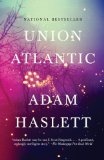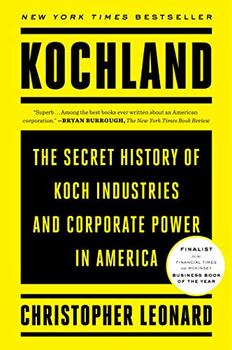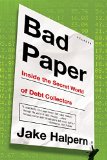Summary | Excerpt | Reading Guide | Reviews | Beyond the book | Read-Alikes | Genres & Themes | Author Bio

Critics' Opinion:
Readers' Opinion:
First Published:
Feb 2010, 320 pages
Paperback:
Feb 2011, 320 pages
 Book Reviewed by:
Book Reviewed by:
Amy Reading
Buy This Book
If Theodore Dreiser or Henry James were transported to the early twenty-first century, they'd surely recognize the banking crisis as the defining narrative of our time: the rise and fall of the men who sift the globe's money through their fingers. In their stead, Adam Haslett has absorbed the newspaper headlines and reimagined them as a pitch-perfect, tightly plotted novel of a singular moment in all-too-recent American history.
In the character of Henry Graves, the head of the New York Federal Reserve, Haslett has created a powerful intelligence able to sense the connectedness, the flow of money, behind the stage set of everyday life. The novel hums when it inhabits Henry's mind as he channels the unvoiced poem of capital. Henry stands at his office window one Friday afternoon, watching New Yorkers as they leave Manhattan and head out to the suburbs for the weekend, where
"they would swipe their cards through magnetic strips and thus do what for centuries had been the sole province of kings and parliaments: they would create money… And as they slept, the merchants' computers would upload their purchases and into the river of commerce another drop of liquidity would flow, reversing their commute, heading back into the city to collect in the big, money-center banks, which in the quiet of night would distribute news of the final score: a billion a day shipped to Asia and the petro states."
Henry is a steady believer in "loans, lines of credit, borrowed money - the vast creationary incentive of compound interest, blind artificer of the modern world." Of course, his position atop the nation's banks also tunes him into the political expediencies and naked fraud which power the system just as much as consumer spending.
Yet for a novel about money, power, and secrets, Union Atlantic is strikingly unconspiratorial, especially compared to other recent novels about capitalism like Chronic City or The Privileges. Doug Fanning, the second-in-command at Union Atlantic, is the bad seed, a self-made man whose outsize ambition and anger at his working-class origins cause him to overstep the rules. He uses inside information to place huge bets on the Nikkei stock exchange, and then must keep moving more and more money from the bank's other departments into his accounts to cover the gigantic losses when the market tilts down. Yet the novel never suggests that Fanning's actions might be catastrophic. This is 2002, after all: the housing bubble has not yet burst and the credit market has not yet frozen. The novel proceeds with unquestioned confidence that the regulatory system will work, Fanning will be caught, and the upstanding Henry Graves will right the listing ship. It is here that Haslett might have strayed a bit further from the headlines to invent a story that exposes us more starkly to ourselves.
As the drama unfolds within Union Atlantic, Henry's sister Charlotte stands on the outer edge of the novel's world, holding forth like a deranged Greek chorus on the corruption and injustice of American history. Charlotte gives the novel its third dimension. Though it would infuriate him to realize it, her story explains why Doug, her enemy, acts the way he does. Charlotte's madness comes in part from her unfulfillment as a female intellectual without standing in the world, and her thoughts circle around the one time in her life when she did feel noticed, when she fell in love with a young man named Eric. For a brief moment, she was the recipient of Eric's "lucid sympathy," and since then she has never been "as richly acknowledged." Doug, for his part, has never felt such intimacy.
My one complaint is that the character of Nate Fuller, the high school student whom Charlotte tutors and Doug sleeps with, is unnecessary, puzzling, and underdeveloped. It is not clear why Doug would risk his success on a fling with a minor, nor does Haslett convincingly portray what motivates the straight man to succumb to the gay teenager's pathetic seduction. "Jesus. Come on, then," Doug says when he brings Nate into his bed for the first time. Nate isn't even a plot device: if every one of Nate's scenes were surgically removed, the novel would remain almost entirely unchanged.
Deep into Union Atlantic, Charlotte Graves quotes from Walt Whitman's poem, "To a Historian," and the lines seem like a précis for the novel itself: "You who celebrates bygones, / Who have explored the outward, the surfaces of the races, the life that has exhibited itself, / Who have treated of man as the creature of politics, aggregates, rulers and priests, / I, habitan of the Alleghenies, treating of him as he is in himself in his own rights, / Pressing the pulse of life that has seldom exhibited itself, (the great pride of man in himself), Chanter of Personality, outlining what is yet to be, / I project the history of the future." Union Atlantic is a novel sent into the future, a novel so embedded in its time that, like The Great Gatsby or Bonfire of the Vanities, it will epitomize a specific cultural moment to later generations. As a Chanter of Personality, Haslett brings into embodiment the individual desires that power the global financial network.
![]() This review was originally published in The BookBrowse Review in March 2010, and has been updated for the
February 2011 edition.
Click here to go to this issue.
This review was originally published in The BookBrowse Review in March 2010, and has been updated for the
February 2011 edition.
Click here to go to this issue.

If you liked Union Atlantic, try these:

by Christopher Leonard
Published 2020
Just as Steve Coll told the story of globalization through ExxonMobil and Andrew Ross Sorkin told the story of Wall Street excess through Too Big to Fail, Christopher Leonard's Kochland uses the extraordinary account of how one of the biggest private companies in the world grew to be that big to tell the story of modern corporate America.

by Jake Halpern
Published 2015
A vital exposé that is also a bravura feat of storytelling.





The House on Biscayne Bay
by Chanel Cleeton
As death stalks a gothic mansion in Miami, the lives of two women intertwine as the past and present collide.

The Flower Sisters
by Michelle Collins Anderson
From the new Fannie Flagg of the Ozarks, a richly-woven story of family, forgiveness, and reinvention.

The Funeral Cryer by Wenyan Lu
Debut novelist Wenyan Lu brings us this witty yet profound story about one woman's midlife reawakening in contemporary rural China.
Your guide toexceptional books
BookBrowse seeks out and recommends the best in contemporary fiction and nonfiction—books that not only engage and entertain but also deepen our understanding of ourselves and the world around us.